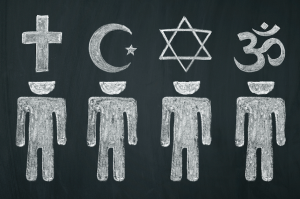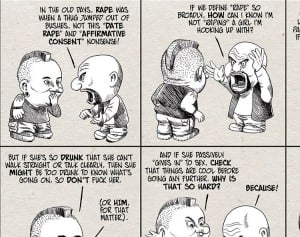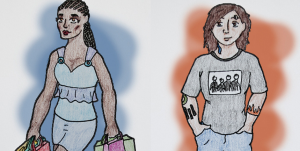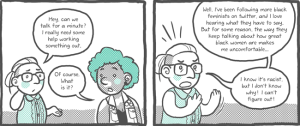
In the foreground is a person who’s just been fired, who’s holding a box of their belongings. Behind them are several ex-coworkers.
In the wake of Donald Trump’s win in the 2016 election, the left has been at a crossroads. It’s important that in the midst of our mourning, we look back on where we may have gone wrong and what we could have done or should have done differently in order to prevent Trump’s rise to power – and to refuse to do so would be foolish.
There are many lessons to learn from the 2016 presidential election, and there are also a lot of painful issues to reckon with.
Unfortunately, most of the proposed ways to move forward have, in part, championed an erasing of the crux of progressive politics: “identity politics.” These strategies, often put forth by men – and, in particular, white men – have attempted to de-center women and people of color on the left.
Bernie Sanders insisted that economic policies needed to be at the forefront of the Democratic Party platform – then he described, over and over again, a political philosophy in which identity politics and economic justice were not intertwined, but in opposition to one another, or ranked in importance in relation to one another. In the New York Times, another white man purported that a focus on identity had cost Democrats the election.
These men are wrong. And when they elevate their perspectives, especially in a time of rather unmitigatable hate and violence toward the most marginalized, they’re threatening to leave us behind.
These men, and the philosophies they’re attempting to mainstream on the left, ignore that Hillary Clinton, a woman, is the second most popular candidate in American history as determined by votes won – second only to Barack Obama, a black man.
They disregard that the current public mandate in the US is one which overwhelmingly favors centering race, gender, sexuality, (dis)ability, and other aspects of our identities, as well as the intersections among them.
They refuse to acknowledge that the white voters who came out for Trump were likely motivated not by so-called “economic anxiety” but by the fear, anger, and divisiveness stoked by his campaign based in racism, sexism, and just about every other “ism” the left has, over time, come to fight in full force. They erase the fact that working-class people of all races came out in large numbers for Hillary Clinton, and in fact are part of her “base.”
They erase the fact that white women, who are being scapegoated as the villains of the election, voted for her in larger proportion than they have any Democrat in recent history. And most notably and conveniently, they gloss over the fact that white men, who favored Romney by a 7-point margin in 2012, favored Trump against the most qualified person to ever run for the office (who just so happened to be female) by almost double that.
Make no mistake: Economic justice without identity politics is an identity politic all its own. It’s one that centers white working-class men and erases the rest of us.
White working-class people matter. So do we. Black working-class people matter. White middle-class women matter. Non-binary queer youth matter. Disabled Muslim women matter. For so many of us, our liberation is reliant not just on economic justice but on racial justice, gender justice, and dismantling other insidious power structures at the same time that we tear down barriers and challenges facing the poor.
To act as if economic salvation will actually save us – or deliver us from evil – isn’t just naive. It’s dangerous.
It puts our lives at risk and extends our oppression. It renders the ways in which women suffer from wage inequality, or people of color suffer from housing discrimination, or queer people suffer from hiring discrimination, or trans women suffer from disproportionate violence, invisible. It maintains a social hierarchy that puts white folks and men at the top and the rest of us peeling back the dirt and attempting to climb out from the bottom.
As someone who was raised by a working-class mother with no college degree, I understand that issues like poverty and classism are real and tangible, and that the impact they have on the lives of those with less means is one that is suffocating and, often, overwhelming in its depth.
But as a queer person, a woman, and a multi-racial person, I also know that my mother’s gender, my father’s race, and my sexuality have shaped my journey out of poverty – and I don’t want to watch the left continue to ignore to how important they are.
Women and people of color need economic justice, too, and they have been thirsting for it for much too long. We must demand that nobody gets left behind as the left moves forward.
And here are three crucial reasons why you should join us in this.
1. Issues of Race and Gender ARE Working-Class Issues
At its heart, feminism is an identity politic. By fighting for social, political, and economic equality for women – and addressing the intersections and interplay between gender, race, (dis)ability, and other identities that face discrimination and marginalization – the feminist movement is defined in relation to how our identities impact our experiences and shape our lives.
But that doesn’t mean the feminist movement doesn’t have the chops to fight for economic justice. In fact, the feminist movement has always been a movement that inherently encompassed economic justice.
In fighting for an end to gender inequality and race discrimination, the feminist movement has come to stand for equitable hiring practices, equal pay, a higher minimum wage, fighting ableism in the workplace, expanding labor laws that protect workers from unfair practices, sustainable growth and development, better health care coverage for employees, and other critical parts of the fight to end poverty directly, through economic practices and policies.
There has long been an economic justice component to the larger mission of feminism. (There’s even an entire section of this very feminist website devoted to it!) That’s because you can’t have a movement to lift up marginalized folks that doesn’t encompass the economic oppression they experience.
When we tie the fight for economic justice into our fight for liberation from heteropatriarchy and kyriarchy, though, we do so without centering white men. (And thus, practice bottom-up organizing the right way.)
2. Economic Justice Cannot Happen Without Racial and Gender Justice
There’s a reason – beyond my own feminist perspective through which I see the world – that centering economic justice in opposition to or as polarized from racial and gender justice will ultimately fail to deliver us all from oppression, though.
And that’s because issues of identity shape economic marginalization – and the people who suffer most from it are, in fact, those who live at the intersections of various marginalized communities.
Economic justice must encompass racial and gender justice – because without it, economic inequality will persist. Period.
To approach economic justice without talking about the unique ways in which women are economically oppressed – without talking about the wage gap, pregnancy discrimination at work, sexual harassment in the workplace, and the devaluation of “women’s work” – would leave us with a half-baked form of economic liberation. To act like economic justice is possible without gender justice is a fantasy of epic proportions – and what we will get, instead, is economic liberation that advances only the economic well-being of those with male privilege, putting women and femmes at more of a disadvantage.
For they are already at a disadvantage economically – no matter what their socioeconomic status.
They are paid less than men. They are harassed and discriminated against at work. They are overlooked for promotions. They are punished for having families.
And when we talk about “working-class” people, let’s not mince facts: Women are a majority of low-wage workers. The movement for economic justice cannot erase gender. If it does so, it will fail to succeed.
Similarly, approaching issues of economic justice without embracing racial justice wholeheartedly only serves to weaken the noble goal of destroying capitalist hierarchies that keep the poor toiling in poverty and bolster the 1 percent. People of color will be the majority of the working-class by 2032. They face hiring discrimination. They are attempting to rise in the ranks of various sectors despite pervasive institutional racism. They make less, on average, than their white counterparts.
Economic justice can only be achieved when all people have access, economically, to the same opportunities for success and the same benefits of our nation’s economic prosperity. Economic justice cannot happen in spite of the kinds of practices and cultural norms that shape the unique challenges women and people of color face economically. It must happen by directly addressing these challenges.
Achieving economic justice without addressing identity politics is impossible. Period.
3. Now Is Not the Time to Center Whiteness
Perhaps the most important bone I have to pick with the left right now, however, is the notion that we should have to “choose” between economic justice and identity politics.
We don’t have to choose. We never have. The left has moved steadily toward a more united front because it has embraced intersectionality, honored the ways in which our struggles are bound up in each other, and refused to make us parse out our identities. This is the way forward.
Now is not the time to center whiteness or maleness or able-bodiedness or being cisgender. Being trans, a person of color, or a woman has never been more dangerous. In the first three weeks alone after Donald Trump became the President-Elect, over 900 gender-, race-, or otherwise identity-motivated acts of hate and harassment were reported to the Southern Poverty Law Center.
Trump is appointing cabinet members who threaten to roll back the progress we’ve accomplished in basically every political arena since the New Deal. He ran for office by creating division, and he has yet to truly promise not to rule with the same rhetoric (despite his remarks at the Orlando leg of his “Victory” Tour in December).
Now is not the time to center whiteness or maleness.
This doesn’t mean ignoring the working-class in exchange for centering gender and race. It doesn’t mean ignoring gender and race to center economic justice.
It means moving forward not by narrowing our focus, but by expanding our approach. That is possible. We don’t need to abandon identity politics in order to achieve economic justice.
We aren’t faced with an impossible choice. We don’t need to shift away from identity politics that center the most marginalized in exchange for an “economic justice” that is, at its heart, just identity politics for white people.
There’s an invisible tension in the term “working class” on the left right now, and rightfully so. It has become a quick shorthand for “white issues.” It has become a quick shorthand for “able-bodied working-class cisgender men.” It has become a term which denigrates the fights that shaped the left – all of which were based, in some way, in identity politics.
The Civil Rights movement was about the kinds of identity politics that center the most marginalized. The fight for immigration reform is about identity politics. The women’s liberation movement was about identity politics.
Ending racism and sexism is not a fight waged in opposition to the fight for economic justice. It never has been. We can have both. We should demand as much. The fight for full social, political, and economic equality for all people has been raging on for decades. Where have these white guys been, and how did they miss it?
***
Our truest fight is, above all, the fight for equality for all people, around the world and at home. Lifting up the most marginalized is our battle call. Demanding accountability from the systems that oppress us is our rallying cry.
Fighting for a world in which we are each deemed as valuable, worthy of respect, and deserving of opportunity is our commitment to each other.
It is time for us to expand, not to shift. We can certainly expand our dialogue – but we cannot compromise on ending racism, sexism, homophobia, cissexism, ableism, and so on just to entice privileged white working-class folks into our movement.
We stand together or we stand for nothing.
[do_widget id=’text-101′]
Carmen Rios is a Contributing Writer for Everyday Feminism. She splits her time disparately between feminist rabble-rousing, writing, public speaking, and flower-picking. A professional feminist by day and overemotional writer by night, Carmen is currently Communications Coordinator at the Feminist Majority Foundation and the Feminism and Community Editor at Autostraddle. You can follow her on Twitter @carmenriosss and Tumblr to learn more about her feelings.
Search our 3000+ articles!
Read our articles about:
Our online racial justice training
Used by hundreds of universities, non-profits, and businesses.
Click to learn more




















